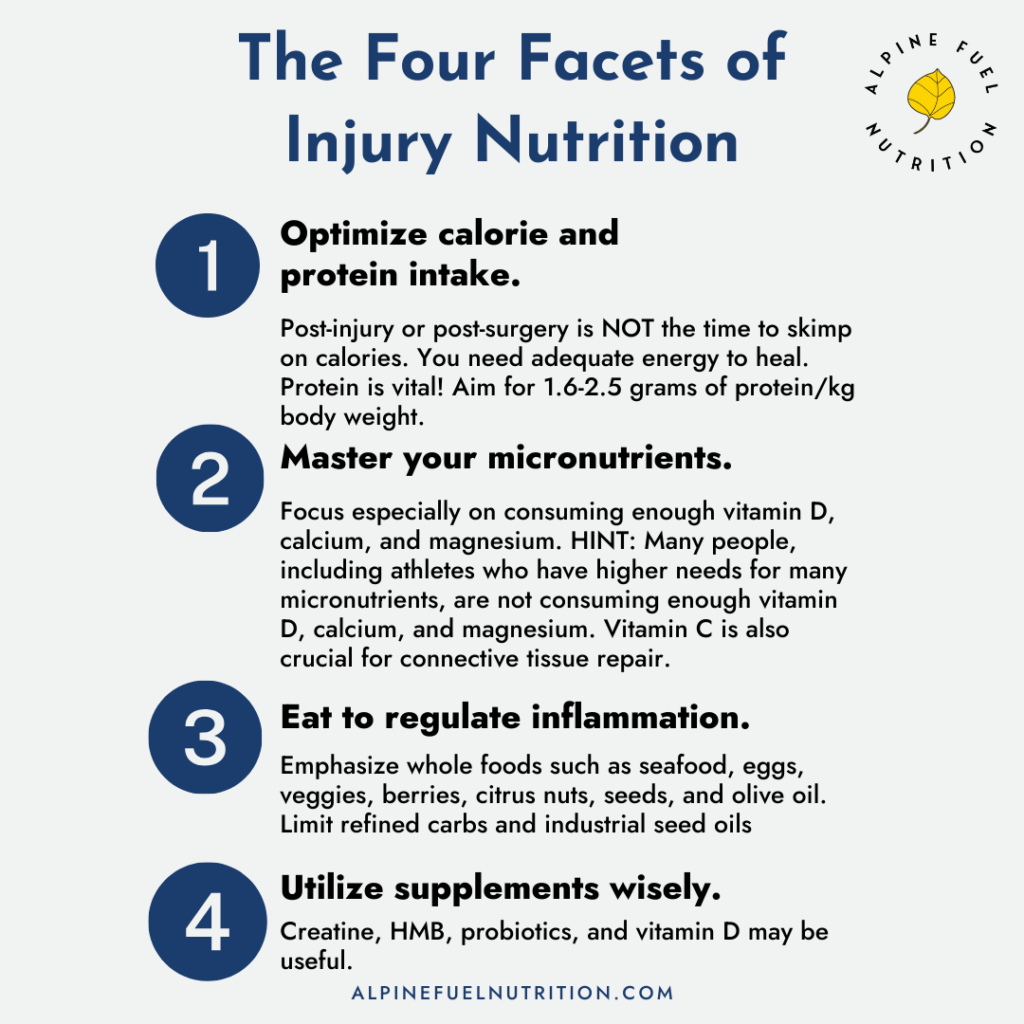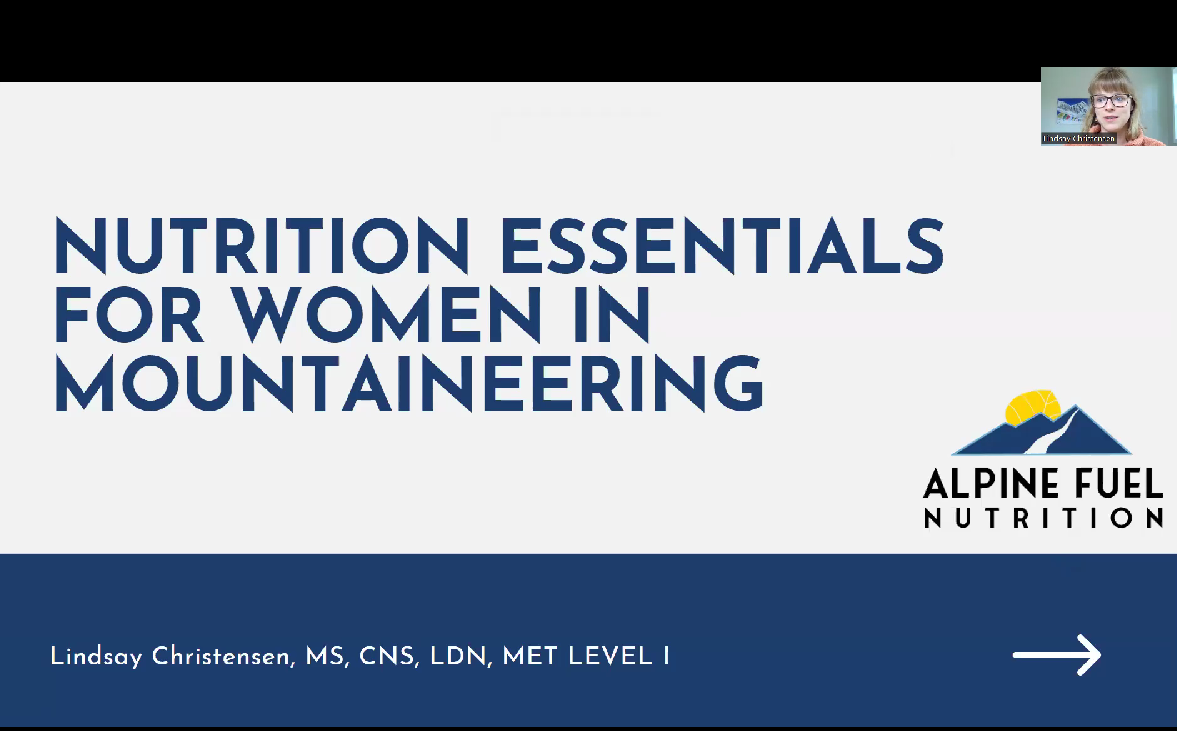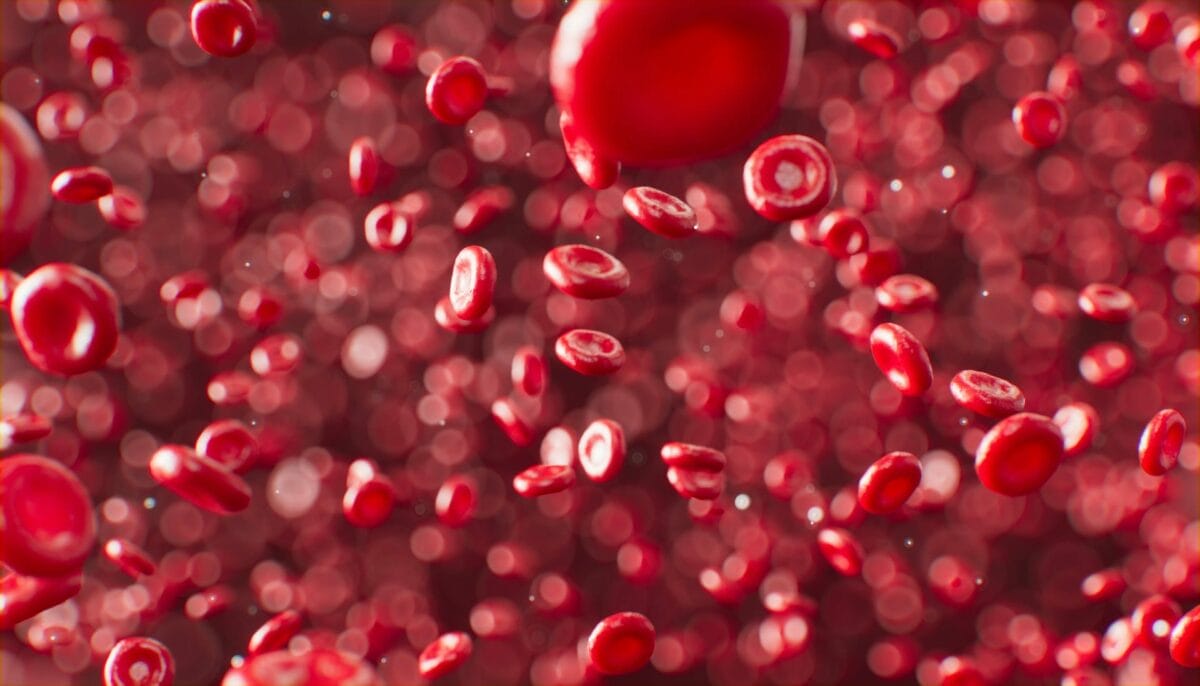

Injury – it’s the thing all athletes desperately want to avoid! After all, when you are injured, it is difficult if not impossible to engage in the athletic pursuits you love.
Common injuries sustained by athletes (especially mountain athletes like runners, cyclists, thru hikers, and climbers) include bone stress injuries, broken bones, Achilles tendonitis, ACL tears, and concussions. In some cases, athletic injuries can even escalate into situations that require surgery. (Source, Source, Source)
While injuries happen and surgery is sometimes necessary, you needn’t leave your recovery process up to chance! Injured or post-surgical athletes are often advised to complete physical therapy and rest appropriately. However, in my experience talking with athletes, nutrition is often vastly overlooked in the recovery process!
The truth is that proper nutrition can make a BIG difference in your injury or surgical recovery process. If you want to recover fully, it should be a central part of your plan, alongside physical therapy and rest.
As a sports nutritionist and avid runner who has sustained my fair share of injuries over the years, including a very painful iliac crest stress fracture as a young runner, I can attest to the importance of proper nutrition for optimal injury and surgical recovery.
In this blog, I’ll cover injury nutrition essentials so you can recover faster from your injury or surgery and return to the sports you love in tip-top shape!
Please note that I am an affiliate for some of the products I’ve linked to in this post. If you click the link here and make a purchase, I may earn a commission at no extra cost to you.

Nutrition plays a pivotal role in recovery from sports injuries and surgery, yet in my experience, it receives far less attention than other recovery modalities.
For example, most athletes have a physical therapist, an orthopedic doctor, and possibly a massage therapist on their recovery “team,” but very few include a sports nutritionist on their team. This is a mistake because nutrition is essential for the body’s ability to heal, repair tissues, and regain strength!
There are two main pathways through which nutrition affects recovery:
First, athletic injuries and surgery raise inflammation, and your diet can profoundly affect your body’s total inflammatory burden.
To be clear, it is normal (and necessary) to experience acute inflammation after an injury or surgery – this initiates the healing process. However, chronic inflammation can hinder healing, making it difficult to bounce back and resume physical activity. Your food choices can either alleviate or aggravate the chronic inflammatory process, thereby affecting your body’s recovery.
Secondly, your body requires specific nutrients, including protein, vitamins, and minerals, to fuel the healing process. Your recovery may be compromised if you are unable to meet your body’s nutritional needs through your diet.
In short, what you eat or don’t eat can either help or hinder your recovery from a sports injury or surgery!
Next up, let’s discuss the four facets of injury nutrition that I focus on with my athletic clients.
In my work with sports nutrition clients, there are are four facets of injury nutrition that I focus on:
Let’s discuss each of these principles in turn.

What’s the first thing most athletes do to their diet when they get injured or undergo surgery, and their activity level is suddenly reduced? They cut back on calories to avoid gaining weight. Unfortunately, this strategy may backfire. Let’s talk about why.
Even though your activity level is reduced while recovering from your injury or surgery, this is not the time to skimp on food! Bone and tissue healing are energy-demanding processes; if you don’t eat enough, your body may break down excessive amounts of muscle (causing you to lose muscle mass), and your return to sport may be compromised.
Furthermore, calorie insufficiency can be a major underlying cause of bone stress injuries (i.e., stress fractures) especially when the stress fracture occurs more proximal to the center of the body. For example, a proximal stress fracture would be one in the iliac crest (like I experienced as a young runner). A distal stress fracture, such as one in the foot, is usually related more to overuse.
The key is to eat the right amount and types of foods to support healing, not to drastically cut back on your food intake.
To determine your calorie needs during injury or surgical recovery, start by determining your estimated energy requirement (EER) using an energy needs calculator. Then, add 10-15% more calories to account for the energy demands of injury recovery. Keep in mind that the number generated through this calculation is an estimate.
For a more precise analysis of your energy needs, I recommend working with a sports nutritionist, who can work with you to determine your optimal calorie intake and macronutrient (protein, carb, and fat) targets.
The types of “calories” that are best to cut back on during your recovery are those that come from processed foods.
When training hard, you may get away with eating processed foods such as fast food, chips, and baked goods occasionally. However, these foods pack in many calories, offer little nutritional value, and can promote inflammation, all undesirable effects when recovering from an athletic injury or surgery.
Instead, focus on getting your calories from minimally processed whole foods: High-quality meat, poultry, seafood, eggs, veggies, fruits, nuts, seeds, dairy products, whole grains, and legumes.
An optimal protein intake is essential for injury and surgery rehab in athletes. Amino acids, the building blocks of protein, are components of muscles, tendons, ligaments, and bones. When these tissues are damaged by an injury or surgery, we need to consume plenty of amino acids to repair them. Furthermore, an optimal protein intake can help preserve your muscle mass while you recover.
The ideal amount of protein for supporting injury or surgical recovery depends on age, sex, body weight, current activity level, and the type of injury or surgery you are recovering from. In my nutrition practice, I’ve found that a protein intake of 1.6-2.5 grams/kg total body weight works well for many athletes during recovery.
Furthermore, I recommend emphasizing proteins rich in the amino acid leucine. Leucine increases muscle protein synthesis, a process necessary for healing. The foods highest in leucine include red meat, poultry, seafood, eggs, dairy products, and soy products, such as tofu. (Source)
Protein timing also matters. Distributing your protein intake evenly across your daily meals may be more effective than eating a large “dose” of protein at one meal and smaller “doses” at your other meals for supporting sports injury and surgical recovery. (Source)
Finally, I recommend incorporating a particular type of protein – collagen – into your recovery nutrition plan. Collagen is a component of tendons, ligaments, and bone. Consuming collagen-containing foods may help repair connective tissues and bone by providing amino acids that support the structure of these tissues.
Preliminary research suggests that supplemental collagen may aid recovery from Achilles tendinopathy, reduce knee discomfort, and support fracture healing. Dietary sources of collagen include bone broth and collagen peptides; collagen peptides can be used in smoothies, just as you would use protein powder. (Source, Source, Source)
Your body needs an array of vitamins and minerals, including vitamin D, calcium, magnesium, and vitamin C, to support injury and surgical recovery.
Optimizing your vitamin D, calcium, and magnesium intake is essential, especially if you’ve experienced a bone-related injury, such as a stress fracture. Calcium and magnesium are essential structural components of bone, while vitamin D helps your gut absorb calcium.
People in the U.S. are notoriously vitamin D deficient; studies show that nearly 41% of American adults have insufficient vitamin D levels, while 22% have a moderate deficiency and 2% have a severe vitamin D deficiency. (Source, Source)
Athletes are not immune to vitamin D deficiency; I’ve worked with athletes who spend a lot of time outside yet still have suboptimal vitamin D levels. If you’re recovering from an injury or surgery, you’ll definitely want to get your vitamin D level tested to ensure you have enough of this nutrient; if you’re low, you may need a vitamin D supplement.
Our bodies can make vitamin D through sun exposure. While this is a viable strategy for maintaining a healthy vitamin D level during the spring and summer, you can’t rely on sun exposure to produce this nutrient during the fall and winter, especially if you live above 37 degrees north latitude (a significant portion of North America lies above this latitude).
I recommend all athletes get their vitamin D level tested by their doctor or another qualified healthcare provider when recovering from an injury or surgery. If your vitamin D level is inadequate, work with your provider to determine an optimal vitamin D dosing strategy.
It is crucial to get your vitamin D level tested before beginning supplementation because your baseline level will inform how much supplemental vitamin D you should take; furthermore, it is possible to take too much vitamin D, so testing helps us avoid this problem.
Last, vitamin D is found only in small amounts in certain foods, such as fatty fish and dairy products. Although I usually take a food-first approach to optimizing nutrition, I will be the first to admit that food alone is typically NOT enough to maintain an optimal vitamin D level.
Calcium is well known for its role in bone structure and is essential for bone healing after a fracture or bone stress injury. Your body tightly regulates calcium levels, so a blood calcium measurement is NOT a reliable indicator of your dietary calcium intake.
The best way to figure out how much calcium you’re consuming is to track your food for a few days. I recommend that my clients track their food in an app, such as Cronometer (no affiliation), for several days to see how much calcium they eat and whether they need to increase their intake.
The top whole-food sources of calcium to focus on include dairy products, bone-in canned fish such as sardines and mackerel, bok choy, collard greens, broccoli, chia seeds, almonds, and sesame seeds/tahini.
Finally, magnesium is also essential to forming the bone matrix (along with calcium). Athletes may be prone to magnesium deficiency; conversely, optimizing magnesium intake may reduce the risk of bone injuries and improve bone density. If you want to learn more about food and supplemental sources of magnesium, check out my blog about the health and performance benefits of magnesium for athletes. (Source, Source)
Vitamin C is a crucial antioxidant nutrient that your body uses to reduce inflammation and build collagen, making it vital for injury and surgical recovery.
It is best to optimize your vitamin C intake through food rather than supplementation since supplemental vitamin C may not provide the full spectrum of benefits offered by vitamin C-rich foods. The top food sources of vitamin C include citrus fruits, kiwi, bell peppers, broccoli, and kale.
Inflammation is a reaction in which immune cells infiltrate tissues to clean up damaged tissue and initiate repair processes. As I mentioned earlier, it is normal to experience acute inflammation after sustaining an injury or undergoing surgery. However, inflammation can pose a significant problem when it becomes chronic. Eating foods that balance your body’s inflammatory response and avoiding foods that exacerbate inflammation will help you minimize chronic inflammation, recover, and return to physical activity faster.
Here are four foods to focus on and one food group to avoid during your recovery:
Omega-3 fatty acids are fats your body can’t produce, so you must consume them through your diet. Research shows that omega-3s dampen muscle damage and inflammation in athletes; research in non-athletes suggests these fatty acids also support healthy bones. While more research is needed, I think there’s enough evidence to support the inclusion of omega-3-rich foods into the diet to support injury and surgical recovery. (Source, Source)
Fun fact: An added benefit of omega-3 fatty acids is that they may help your muscles take up more amino acids, supporting muscle protein synthesis and inhibiting muscle breakdown. (Source)
The best dietary source of omega-3 fatty acids is seafood, such as salmon, halibut, and sardines. Seafood contains the omega-3s eicosapentaenoic acid (EPA) and docosahexaenoic acid (DHA), the most important omega-3s for managing inflammation.
Some plant foods, such as walnuts and flaxseed, contain the omega-3 fatty acid alpha-linolenic acid (ALA). ALA doesn’t offer the same anti-inflammatory benefits as EPA and DHA. While your body can convert some ALA into EPA and DHA, this process is inefficient in many people. Therefore, I don’t recommend relying solely on plant foods for omega-3 fatty acids.
Some athletes choose to supplement with fish oil rather than eat seafood. While fish oil may be an acceptable option, you must check with your healthcare provider first because there are potential interactions between some medications and fish oil.
Turmeric root is a bright orange spice frequently used in Southeast Asian cuisine. Turmeric contains a compound called curcumin that has been found to reduce markers of muscle inflammation following exercise-induced muscle damage in athletic individuals. Preclinical research suggests curcumin may also support bone repair. (Source, Source)
It’s easy to incorporate turmeric (and thus curcumin) into your cooking! You can add turmeric to curries, smoothies, or even “golden milk” tea.
Eating a variety of vegetables and fruits is excellent for your overall health. However, it may be crucial to hone in on this aspect of diet when recovering from a sports injury or surgery.
Vegetables and fruits contain phytonutrients (natural plant compounds) with a broad spectrum of anti-inflammatory effects that may support tissue repair after an injury or surgery. Among fruits, blueberries and tart cherries may be particularly helpful. Green leafy vegetables such as kale, collard greens, and spinach may be especially beneficial vegetables to include in your diet for managing inflammation. (Source, Source)
I also suggest using the free Environmental Working Group’s Shopper’s Guide to Pesticides in Produce to learn which produce is best purchased organic (to avoid excessive pesticide and herbicide residues) and which types of conventionally-grown produce have lower chemical residues and aren’t as important to buy organic.
There are two groups of foods you should avoid to support your recovery process: Refined carbohydrates and industrial seed oils.
Refined carbohydrates include concentrated sugars, such as cane sugar and brown rice syrup, and flour-based foods like bread, crackers, chips, and other baked goods. Consuming these foods in excess promote spikes in blood sugar and changes in your gut microbiome that can hinder healthy immune function, provoke inflammation, and hinder healing. (Source)
Instead, focus on eating whole-food carbohydrates that are gentler on blood sugar and rich in vitamins, minerals, fiber, and phytonutrients. Whole-food carbohydrates include sweet potatoes, root vegetables, fruit, whole grains like quinoa, and legumes like chickpeas and lentils.
Lastly, I recommend that athletes avoid industrial seed oils as much as possible, especially when recovering from an injury or surgery. Industrial seed oils are the oils expressed from oilseeds, including canola (rapeseed), corn, cottonseed, grapeseed, safflower, soybean, and sunflower oils; these oils are frequently found in packaged foods and restaurant food.
Research suggests these oils (especially soybean oil) increase inflammation and inflammation-related chronic health conditions; anecdotally, many of my clients report feeling significantly less inflamed when they cut industrial seed oils out of their diets. Replace industrial seed oils with healthy cooking fats such as olive and avocado oil. (Source, Source)
A growing body of research indicates that certain nutritional supplements may help athletes recover more effectively and faster after sustaining an injury or undergoing surgery.
Here are some supplements that show promise for supporting recovery as part of a comprehensive injury nutrition protocol:
Supplemental collagen may also be helpful for supporting injury recovery in athletes. Collagen is a protein responsible for healthy joints, connective tissue, bones, hair, skin, and nails. Supplemental collagen may be helpful for athletes because it contains specific amino acids (the building blocks of protein) that support connective tissues, and may thus aid in joint, tendon, and ligament repair.
One study found that supplemental collagen combined with calf-strengthening exercises significantly reduced pain and enhanced physical function in people with Achilles tendinopathy, a common injury in athletic people. (Source, Source)
Further research suggests that collagen supplementation can improve joint pain and functionality in people who exercise regularly. (Source)
Most collagen supplements are derived either from fish or bovine (cow) sources. I am personally a fan of Designs for Sport Collagen Complex.
Creatine isn’t just for bodybuilders! According to the International Society of Sports Nutrition (ISSN), supplemental creatine may help prevent or reduce the severity of injury, helping active people people recover from injury at a faster rate.
There is some evidence in team sport athletes that creatine supplementation reduces muscle tightness, muscle strains/pulls, and non-contact injuries. It also increases exercise capacity in people with cervical-level spinal cord injuries, and it may lessen muscle atrophy following immobilization (which often occurs after an injury or surgery). (Source, Source, Source)
Creatine is one of the most well-studied supplements on the market. Research shows that creatine is very safe even at high doses of 20+ grams/day for months or years. Fortunately, you don’t need to take a high dose to get the benefits of this compound. A protocol of 3 grams/day for 28 days can saturate creatine stores (negating the need for an intense creatine loading protocol).
The only real potential downsides are weight gain (from increased intracellular water storage) and GI distress such as bloating in some people. While some case studies have suggested that people with renal dysfunction should avoid creatine, the scientific literature actually doesn’t support this. However, I think it is still wise to have an individual talk with their physician before supplementing with creatine if they have pre-existing kidney issues.
HMB is a metabolite of the amino acid leucine that has been shown to reduce exercise-induced muscle damage and speed up the regenerative capacity of skeletal muscle. It stimulates muscle protein synthesis and inhibits protein breakdown, suggesting it may be useful for supporting the body during the post-injury/post-surgery catabolic state. (Source)
Probiotics may also be a helpful supplement to add to your injury nutrition toolkit!
Probiotics are defined as “live microorganisms which, when administered in adequate amounts, confer a health benefit to the host;” the “host” is you! In other words, probiotics are gut-friendly bacteria that help support your health. Examples of probiotics include the lactic-acid-producing Lactobacillus bacteria, Bifidobacteria, and the friendly yeast Saccharomyces boulardii.
Studies show that some probiotics have antioxidant actions that help decrease muscle injury induced by free radicals. Preliminary research also suggests that probiotics may improve bone fracture healing, possibly by improving the absorption of bone-building nutrients in the gut. Pretty fascinating! All in all, it seems like probiotics may be a worthwhile addition to an injury nutrition protocol for athletes. (Source, Source)
Probiotic quality varies widely, so I recommend working with a qualified nutrition professional who can help you select a high-quality, effective probiotic that will suit your unique needs.
**Vitamin D, discussed in the micronutrient section above, typically needs to be consumed in a supplemental form in order to raise one’s vitamin D level into the optimal range. Therefore, I would also include vitamin D supplements in this section. I recommend choosing a vitamin D supplement that also contains vitamin K2. Vitamin K2 is another fat-soluble vitamin that facilitates vitamin D and calcium metabolism.
If you’ve been sidelined by a sports injury or surgery, chances are you want to do everything possible to recover and return to your active lifestyle. By making good nutrition a top priority during your recovery process, you can accelerate your healing process and get back to the sports you love feeling great and in optimal shape!
If you need personalized, one-on-one nutrition guidance for sports injury or surgical recovery, performance, and daily life, I’d love to help you in my sports nutrition practice! If you’re ready to optimize your nutrition for recovery, enhanced health, and athletic performance, schedule a discovery call with me!
The content provided on this nutrition blog is intended for informational and educational purposes only. It is not a substitute for professional medical advice, diagnosis, or treatment. Always seek the advice of your physician or other qualified health provider with any questions you may have regarding a medical condition. Never disregard professional medical advice or delay seeking it because of something you have read on this blog.
The information and recommendations presented here are based on general nutrition principles and may not be suitable for everyone. Individual dietary needs and health concerns vary, and what works for one person may not be appropriate for another.
I make every effort to provide accurate and up-to-date information, but the field of nutrition is constantly evolving, and new research may impact dietary recommendations. Therefore, I cannot guarantee the accuracy or completeness of the information presented on this blog.
If you have specific dietary or health concerns, please consult a qualified nutritionist or another healthcare professional for personalized guidance.
I empower others through nutrition to conquer their mountain adventures, drawing from my own experiences.
With a background in Biomedical Science and an M.S. in Human Nutrition, I’m a Certified Nutrition Specialist and Licensed Dietitian Nutritionist. My journey in functional medicine has equipped me to work alongside athletes and tackle complex health cases. As a passionate trail runner, backcountry skier, and backpacker, I strive to support others on their paths to peak performance and well-being.









Sign up for updates that come right to your inbox.